#enslaved black woman played by Oprah
Text
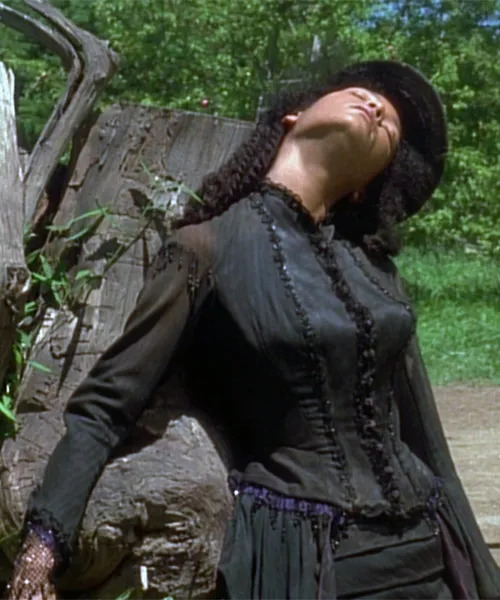
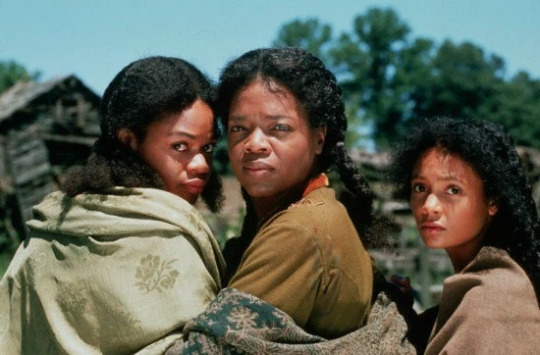
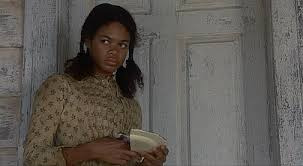
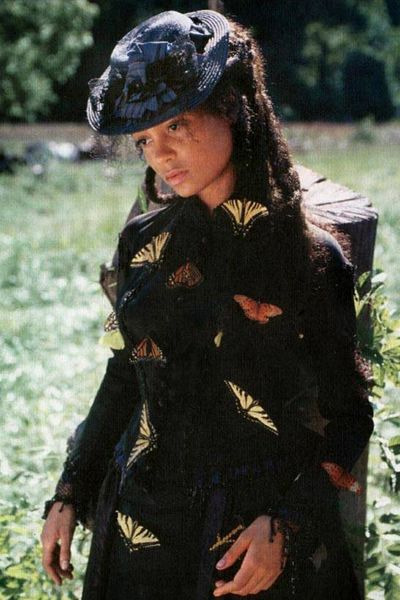
BELOVED - 1998
#jonathan demme#thandie newton#oprah winfrey#kimberly elise#beloved#toni morrison#underrated af#came out at the wrong time#ahead of its time#plus the trauma in this movie is the heaviest I've ever seen for specifically black generational trauma#the story SPOILERS...#enslaved black woman played by Oprah#named Sethe#murders her infant child born of SA#is later haunted by a haint/ghost/spectre of the child played by Thandie#another spooky black southern gothic movie#that isn't talked about as much as Eve's Bayou#paul newman said it was the best movie he'd ever seen#but it was predictably snubbed at the oscars#tough watch darkly beautiful#A+ aesthetic and performances#halloween reflections of blackness#black american gothic#the book is better of course#but the movie is good
102 notes
·
View notes
Text
Seed Money: Black Entrepreneurs Hope Pandemic Gardening Boom Will Grow Healthier Eating
DENVER — Ietef Vita had planned to spend most of 2020 on the road, promoting “Biomimicz,” the album the rapper had released on his #plantbasedrecords label in January. Vita, known to his fans as “DJ Cavem Moetavation” and “Chef Ietef,” had those plans unexpectedly cut short.

This story also ran on NPR. It can be republished for free.
“We were in Berkeley, California, on Feb. 29, playing there and literally got out of town right before they shut the whole country down,” recalled Vita, 34, who has performed for the Obamas and is widely considered the father of what’s known as eco-hip-hop. “It was scary.”
Suddenly sidelined at his metro Denver home with his wife, Alkemia Earth, a plant-based-lifestyle coach, and three daughters, Vita struggled to pivot. Eventually, he accepted that he would need to stay put and, as the saying goes, bloom where he was planted.
With his wife’s help, he launched an impromptu campaign: mailing out thousands of the more than 42,000 packets of kale, beet and arugula seeds he’d planned to sell at his shows, all emblazoned with his likeness and the QR code to hear his digital album. With the help of a crowdfunding campaign, he sent them at no cost to urban farmers anywhere and everywhere the couple could think of — Minneapolis, St. Louis, Cincinnati, Chicago, New York City, several parts of California and his hometown of Denver. He hoped the seeds might help alleviate the food shortages and long lines at grocery stores and food banks in economically disadvantaged communities hit hard during the pandemic.
His effort of putting out beets with his beats was a success. And, more than a year later, his seed business is still growing. Vita is among an expanding list of Black gardening enthusiasts-turned-entrepreneurs across the country. They run seed businesses that have benefited from the pandemic-inspired global gardening boom that seed providers, still overwhelmed with orders, hope won’t subside anytime soon.
Gods Garden Girl, Coco and Seed, Urban Farms Garden Shop and I Grow Shit are all Black-owned companies that share in Vita’s mission of drawing more diverse people into gardening and also illuminating it as an active, pandemic-safe pastime that facilitates healthy eating.
It also provides an escape from stress, including racial stress, which has simmered and exploded at times after George Floyd’s murder in Minneapolis.
Research has found that exposure to plants and green spaces while gardening is beneficial to mental and physical health. In fact, a 2018 article in Clinical Medicine noted that merely viewing plants can reduce stress and diminish feelings of fear, anger or sadness by reducing blood pressure and pulse rate and also relieving muscle tension. The same report urged health professionals to encourage their patients to spend time in green spaces and to work in gardens.
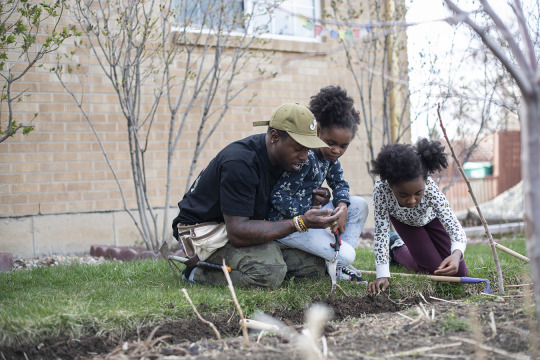
Leah Penniman, a farmer and food activist in New York, wrote in her book “Farming While Black” that Black America’s connection to seeds dates to the days of enslavement, when some Africans braided seeds into their hair when they were shipped away from home. It was, as Penniman wrote, “insurance for an uncertain future.”
But many Black people in the U.S. have intentionally disconnected from farming since then because of its association with the painful legacy of slavery, said Natalie Baszile, author of a recently published anthology on African American farmers and the “Queen Sugar” novel that inspired the Oprah Winfrey Network TV drama centered on a Black family’s Louisiana farm.
“Part of our cultural narrative has been to move away from the land, because moving away from the land represents progress,” Baszile said. “The farther away you are from the land, the more successful you are. You go away to school, you get your education, you get another degree, you get a job in a field where you don’t have your hands in the soil.”
But Baszile, too, hopes the seed and gardening trend will inspire more Black people to see the health benefits of gardening.
“There is a therapeutic element to being outside planting, even if it’s just a flower garden,” she said. “There is something absolutely essential and healthy and meditative about getting outside doing something physical; you’re moving your body, you are getting exercise, you’re breathing clean air, you’re connecting to the Earth.”
And she said connecting to the soil empowers people, whether they are growing their own food or selling seeds as an entrepreneur.
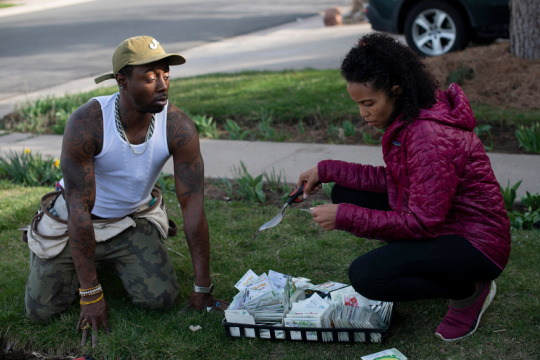
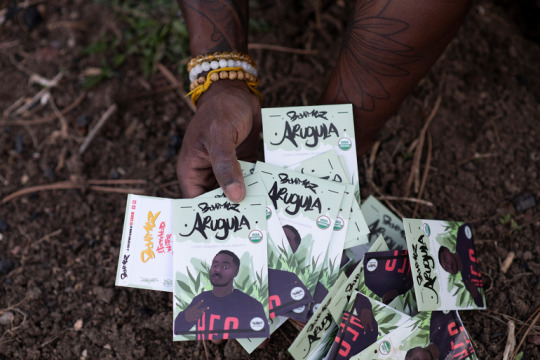
The owner of Melanated Organic Seeds, Devona Stevenson, agrees. She said she initially took up gardening for relaxation in 2018 after a bout of depression. She then launched her seed business last June at the height of the pandemic, because she saw a need, even dating to her days growing up near Miami.
“All I saw around me was fast food and people eating junk food from the corner store,” said Stevenson, who is relocating from Fort Lauderdale, Florida, to nearly 2 acres in Fayetteville, Georgia. “I believe that representation matters. So, basically, I saw a need and decided to fill it. For me, it’s also about reaching an untapped market, a group of people that have not really been marketed to, in terms of gardening and farming.”
Her efforts are not going unnoticed. Stevenson said her list of Instagram followers has swelled from 7,000 to more than 20,000 since she began posting gardening tips last July. She said she believes many Black seed business owners like her are driven by the need for education and economic empowerment.
“My business is for all people — we’re all human — but I happen to be a Black woman and a business owner, and if someone out there wants to support a Black-owned business, a Black gardening business, we provide them with that opportunity,” she said.
Vita’s entrepreneurial endeavor — “pushing seeds,” as he calls it — seems to be having an impact, too. Online site Thrillist named him one of its “Heroes of 2020” and Oscar-winning actor Natalie Portman included his “Sprout That Life” line, which runs about $19 for three packs of 55 to 100 seeds each, in her 2020 Top Gift Picks list in the December issue of People magazine. Actor Mark Ruffalo followed by publicly donating money to Vita’s GoFundMe campaign that supported his seed distribution effort, prompting social media shoutouts from rapper Cardi B and comedian Cedric the Entertainer.
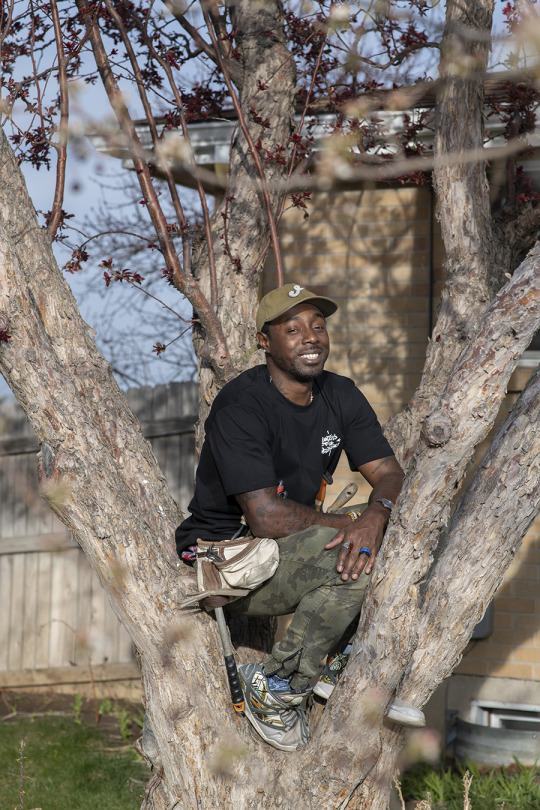
Vita said he sees the fruits of his efforts in the photos people send to him of the food grown from his seeds. He could not be prouder of how he is reaching communities of color, especially Black communities, who he said disproportionately live in food deserts and are plagued by health disparities. “I wanted to change the way that they’re eating, let alone change the economic approach,” he said.
To date, with crowdfunding support, he has distributed more than 20,000 of his seed packets free of charge. He said he hopes the effort, along with his online vegan cooking and gardening demonstrations, will help inspire more Black people to try a plant-based diet and spark, well, a growing movement.
“If we can flood our community with unhealthy food and drugs, I believe we can also flood it with seeds and love,” he said. “We can flood it with positivity and urban farming and juice bars; without gentrification, without the urban renewal replacement.”
KHN (Kaiser Health News) is a national newsroom that produces in-depth journalism about health issues. Together with Policy Analysis and Polling, KHN is one of the three major operating programs at KFF (Kaiser Family Foundation). KFF is an endowed nonprofit organization providing information on health issues to the nation.
USE OUR CONTENT
This story can be republished for free (details).
Seed Money: Black Entrepreneurs Hope Pandemic Gardening Boom Will Grow Healthier Eating published first on https://nootropicspowdersupplier.tumblr.com/
0 notes
Text
On August 6, the world was sad to learn of the passing of Toni Morrison, 88. The most decorated African-American novelist, essayist, editor, teacher and professor of our time.
But who is Toni Morrison?
Early years
Born Chloe Ardelia Wofford on February 18 1931 in Lorain, Ohio, Morrison published her first novel, The Bluest Eye, in 1970. But it was her third novel, Song of Solomon (published in 1977), that brought her national attention and won her the National Book Critics Circle Award.
Morrison used the monikar Toni (a childhood nickname) and her married name Morrison for her first published novel and it stuck. A decision she later regretted.
Her closest family and friends called her Chloe.
Education and Career
She earned a bachelors in English from Howard University (1953) and a masters from Cornell University (1955). Later Morrison would return to Howard to teach.
She began writing fiction as part of an informal group of poets and writers at Howard University. She attended one meeting with a short story about a black girl who longed to have blue eyes, the story she would later develop as her first novel, The Bluest Eye.
She released her second novel in 1973, Sula then came Song of Solomon in 1977 and Tar Baby in 1981.
During this time, Morrison also worked as an editor at Random House; helping to bring the work of African-American authors to life.
She would leave the publishing world in 1983 to focus primarily on writing and teach.
Her first play, Dreaming Emmett – about the murder by white men of black teenager Emmett Till in 1955 – was performed in 1986 at the State University of New York at Albany, where she was teaching at the time.
She also taught at Rutger’s University and Bard College in the early to mid 80s. She would go on to teach at Princeton in 1989 until her retirement in 2006.
In 1987 Morrison published her most critically acclaimed novel Beloved, inspired by the true story of an enslaved African-American woman, Margaret Garner, for which she won the Pulitzer Prize and the American Book Award in 1988.
The book was later turned into a film and released in 1998.
Morrison’s other work included the libretto for an opera based on the Margaret Garner story,Mercy in 2008, the play Desdemona in 2011 and Home in 2012. She also wrote children’s books with son Slade Morrison before his death in 2010 at the age of 45.
During her career that spans over sixty years, Morrison has won over thirty awards and honors for her work, including the Presidential Medal of Freedom from President Barack Obama in 2012.
Personal Life
During her time at Howard, Morrison met and married Jamaican architect Harold Morrison. The couple had two children together, and would later divorce in 1964.
Political influence and activism
Morrison has also been vocal about injustices against Black and brown people for the entirety of her career and in her work.
In 1998 Morrison compared the impeachment of then president Bill Clinton over his cheating scandal with Monica Lewinsky, to the mistreatment of Black people.
“…this is our first black President. Blacker than any actual black person who could ever be elected in our children’s lifetime. After all, Clinton displays almost every trope of blackness: single-parent household, born poor, working-class, saxophone-playing, McDonald’s-and-junk-food-loving boy from Arkansas,” she wrote.
In 2008 she endorsed presidential hopeful Barack Obama. When he won, becoming the first Black president of the United States, Morrison stated, “I felt very powerfully patriotic when I went to the inauguration of Barack Obama. I felt like a kid.”
In April 2015, she would also speak out against white officers who’d killed three unarmed Black men, Michael Brown, Eric Garner and Walter Scott.
“People keep saying, ‘We need to have a conversation about race.’ This is the conversation. I want to see a cop shoot a white unarmed teenager in the back. And I want to see a white man convicted for raping a black woman. Then when you ask me, ‘Is it over?’, I will say yes,” she stated.
After the 2016 election where Donald Trump defeated Hillary Clinton to become the 45th President of the United States, she published an essay, “Mourning for Whiteness.”
She argued that White Americans are too afraid to lose the privileges afforded to them because of their race, which led to the election of Trump, whom she felt was endorsed by the Ku Klux Klan.
Legacy
In 2019 the Toni Morrison: The Pieces I Am documentary premiere at the Sudance Film Festival. It features Oprah Winfrey, Angela Davis, Walter Mosley and Sonia Sanchez among others.
#gallery-0-4 { margin: auto; } #gallery-0-4 .gallery-item { float: left; margin-top: 10px; text-align: center; width: 33%; } #gallery-0-4 img { border: 2px solid #cfcfcf; } #gallery-0-4 .gallery-caption { margin-left: 0; } /* see gallery_shortcode() in wp-includes/media.php */
Related Articles
[Exclusive] Author Teri Woods Talks Domestic Violence & If We’ll Ever Get A “True To The Game” Movie
Author Epiphany Kendell Explains Why “Hood Girls Do It Better…”
Who is Toni Morrison? Her Legacy at a Glimpse On August 6, the world was sad to learn of the passing of Toni Morrison, 88.
0 notes
Text
Toni Morrison, Whose Soaring Novels Were Rooted In Black Lives, Dies At 88
When Toni Morrison received her Nobel Prize in Literature in 1993, her remarks began with a reflection on the phrase once upon a time. In her signature, measured cadence, Morrison told the Swedish Academy she believed these were some of the first words we remember from our childhoods.
Morrison, who was 88, died Monday night at Montefiore Medical Center in New York, according to her publisher, Penguin Random House. Morrison’s family, in a statement released by the publisher, said she died “following a short illness” and surrounded by loved ones.
“She was an extremely devoted mother, grandmother, and aunt who reveled in being with her family and friends. The consummate writer who treasured the written word, whether her own, her students or others, she read voraciously and was most at home when writing,” her family said. “Although her passing represents a tremendous loss, we are grateful she had a long, well lived life.”
Morrison’s work focused on African American life and culture, and she dominated an industry in which depictions of black life were often limited and rooted in stereotype.
Her masterwork, Beloved, was a “once upon a time” based in bloody truth. Its real-life inspiration was Margaret Garner, a woman who escaped slavery and attempted to kill herself and her children — her 2-year-old daughter died — rather than be captured and returned to a plantation. Beloved was awarded the Pulitzer Prize for Fiction in 1988. A decade later, Oprah Winfrey produced and starred in a movie based on the book.
Morrison was 56 when Beloved was published in 1987, but she’d been living with stories since childhood. Born Chloe Wofford, she grew up with tales being told all around her in her hometown of Lorain, Ohio. Her grandparents, like millions of blacks, left the segregated South for the North, during the Great Migration.
“I lived in a little, working-class town that had no black neighborhoods at all …” Morrison told Fresh Air‘s Terry Gross in 2015. “We all played together. Everybody was either somebody from the South or an immigrant from East Europe or from Mexico.”
She said she wasn’t particularly aware of segregation growing up, but that her father “was very, very serious in his hatred of white people.” Her mother mitigated that. “Everybody was an individual whom she approved of or disapproved of based on her perception of them as individuals,” Morrison recalled.
As a child, young Chloe listened when the adults told stories about their southern homes. In a 2010 interview, she said their language stayed with her. Within her own family, she said. “There was street language, there was sermonic language. You know, people actually quoted the Bible to you.”
Wofford went to college at Howard University (where she became Toni, using the nickname of her baptismal saint, Anthony). It was there that she experienced, for the first time, a hierarchy of color within the African American community. “On the campus, where I felt safe and welcome, I began to realize that this idea of the lighter the better and the darker the worse … really had an impact on sororities, on friendships, on all sorts of things, and it was stunning to me,” she said in 2015.
She earned her master’s at Cornell and married architect Harold Morrison, with whom she had two sons. They divorced after seven years.
Morrison started her early publishing career as an editor, first in textbooks, then for general circulation books. She told an audience at the 92nd Street Y in New York that she wasn’t happy with how most black books were being edited back then. “I thought the editing was sloppy,” she recalled. “I thought the productions were mishandled, even the great books, like Roots. … When you read them carefully, you’d see that nobody was paying any attention.”
So she consciously sought out excellent black authors, pulling them into what was — and mostly still is — the alabaster publishing industry. She edited Angela Davis, Muhammad Ali and the novelist Gayl Jones during the social upheaval of the late 1960s and early ’70s. Morrison saw this as her contribution to the Civil Rights movement.
“I made it my business to collect African Americans who were vocal, either politically, or just writing wonderful fiction,” she said.
Even as she edited, Morrison secretly wrote for herself, getting up before her children were awake. She later said that when she wrote, she was free from pain. “It’s where I have control,” she said. “It’s where nobody tells me what to do. It’s where my imagination is fecund and I am really at my best. … I’m thinking up dangerous, difficult things, but it is also extremely safe for me to be in that place.”
Her first book, The Bluest Eye, was published in 1970. It’s a tale about a dark-skinned little girl who believes blue eyes will make her beautiful and cherished.
Piper Huguley, a professor at Spelman College in Atlanta, recalled how she felt when she read The Bluest Eye as a college student. It helped her see “colorism and its connection to self-loathing, and how deeply embedded that could go,” she said. It was a theme Morrison explored further in her 2015 book God Help the Child.
Huguley said that kind of frankness about race has made Morrison’s work essential reading. “She exists in a class we call Seminal Writers, that every English major must take,” Huguley explained. “That means she belongs for us here at Spelman, and no doubt elsewhere, as part of the African American literary canon, that is, an author who must be read.”
Morrison’s stories weave between the familiar and the fantastical: In Song of Solomon, a key element was an ancient folk tale about black people flying away from enslavement and back home to Africa. The theme of mother-daughter love runs through several books, such as Beloved and A Mercy, in which women make terrible sacrifices for their children.
These are books that focus, without apology or explanation, on black lives. And in 1998, as a guest on a talk show, she said she had no interest in making white characters more central to her stories.
“I’ve spent my entire writing life trying to make sure that the white gaze was not the dominant one in any of my books,” she said.
Morrison was grounded in the black cultural liberationist art of the 1960s, said Richard Yarborough, who teaches African American literature at UCLA. She and others in that generation “expressed their mission” by focusing on black lives, he said.
And generations of black women writers, no matter their genre, have been touched by her. “Morrison is such a monumental figure, that there is no way you could write about black women’s experiences without taking her into account,” he said.
She showed, by example, the validity of black, female lives. And through her many “once upon a times,” Morrison’s expansive vision of black humanity now resonates around the globe.
BY KAREN GRIGSBY BATES
The post Toni Morrison, Whose Soaring Novels Were Rooted In Black Lives, Dies At 88 appeared first on Smile store.
source https://smilystore.com/2019/08/06/toni-morrison-whose-soaring-novels-were-rooted-in-black-lives-dies-at-88/
0 notes
Text
Critic's Notebook: Why Female-Driven TV Matters More Than Ever
http://styleveryday.com/2017/08/24/critics-notebook-why-female-driven-tv-matters-more-than-ever/
Critic's Notebook: Why Female-Driven TV Matters More Than Ever
Like the earliest women film directors, today’s female TV creators, from Jane Campion to Ava DuVernay, are using their platform to tackle the biggest of big issues — and making some of the best shows in the process.
Top of the Lake: China Girl, the second season of Jane Campion’s fierce, dazzling detective series for SundanceTV, begins with a dead body in a suitcase. But as Detective Robin Griffin (Elisabeth Moss) searches for the killer, she finds clues in a brothel, and also meets the 17-year-old daughter — the product of rape — she gave up for adoption. As no ordinary police procedural does, China Girl spirals out to explore sex trafficking, abuse and motherhood in many forms, including by adoption and surrogacy.
Campion is one of several high-profile women, including Reese Witherspoon, Nicole Kidman and Ava DuVernay, behind some of the best television series of the moment. When DuVernay created Queen Sugar and declared that the production would hire only women directors, she kickstarted a mini-trend that the industry and press noticed. But that headline has overshadowed the other noteworthy element that unites these women-driven projects and sets them apart from the crowd: their urgent social and political relevance.
These shows are more than just examples of progress in gender equality among small-screen creators (which would be plenty good in itself). They address hot-button issues, exploding typical television narratives with stories that ripple beyond the screen, into the real world.
Queen Sugar deals with class, race and the prison system through the lens of one African-American family. Big Little Lies, produced by and starring Witherspoon and Kidman, takes on domestic abuse and rape in upscale suburbia. Margaret Atwood’s novels have been turned into two resonant series: Hulu’s Handmaid’s Tale, for which four of the five directors were women, is frighteningly timely in its dystopian portrait of a fascist regime that treats women as reproductive property; the forthcoming Netflix series Alias Grace, entirely written by Sarah Polley and directed by Mary Harron, mines the story of a 19th-century murder for themes including abortion and abuse.
It’s not as if men never tackle such subjects, but the pattern among shows dominated by women producers and directors is unmistakable. There is a full-circle aspect to this trend that goes back to the earliest days of movies. The first woman director, Alice-Guy Blache, made films about abuse and poverty. Lois Weber made silent films about alcoholism and prostitution. For a time, until men figured out that Hollywood was a playing field for big business, Weber was the most successful director in the country. In the 1940s and ’50s, Ida Lupino became one of the lone women directors, creating first-rate movies about unwed mothers and rape.
Those filmmakers took on tough subjects not because they were specialized “women’s issues,” but because they were both significant and largely ignored by men. There was no secret agenda, just eyes wide open, and a fearless will to forge ahead. The same is happening in television now.
The best part of the current trend is that these dramas are spectacular as art and entertainment — complex and sophisticated but relatable for men as well as women. China Girl (premiering Sept. 10) displays Campion’s signature artistic flair, with poetic images that convey at least as much as the dialogue does: a bridal gown is held aloft and set on fire after a wedding is called off; the green suitcase holding the corpse is tossed into the ocean, strands of long black hair floating out of a hole in its side. But there is also gritty realism. The casual sexism Robin faces in the Sydney police department is so routine that she brushes it off. Meanwhile, being a mother and a victim of rape are entrenched and entwined in Robin’s richly developed character. There’s no need for Campion to be didactic; the social commentary springs organically from the drama.
Queen Sugar, executive produced by Oprah Winfrey and now in its second season on OWN, offers a character for every class to identify with. Charlie (Dawn-Lyen Gardner) is a rich businesswoman and single mother, whose basketball-star husband was accused of rape. Her story deals with matters from family to celebrity culture. Charlie’s sister (Rutina Wesley) is a journalist crusading for prison reform and against racial profiling. Their brother (Kofi Siriboe) is an ex-convict trying to reclaim his life. Viewers who come for the domestic saga may have their social consciousness awakened along the way. What could be more Oprah?
In Big Little Lies, Kidman’s character is abused by her husband and Shailene Woodley plays a young mother haunted by memories of having been raped. As the addictive HBO show took off among viewers, those issues became part of the conversation in recaps and among writers and fans. A headline on an episode review from The A.V. Club website put it bluntly: “Big Little Lies is telling a vital story about abuse.” A Vulture piece argued that the show, despite its soapy trappings, was “about very big things,” notably “the natural human instinct to pass judgment on others, especially when those others are female.”
The Handmaid’s Tale has penetrated reality even more visibly, as women’s-rights advocates have shown up at marches and protests wearing the red cloaks and white winged caps worn by the enslaved women in the show’s fictional country, Gilead. No one could have predicted how much currency the series would gain simply by landing in the Trump era.
Those feminist issues have always run through Atwood’s work. Alias Grace (premiering Nov. 3) is based on a true story about a servant named Grace (Sarah Gadon) imprisoned for the murder of the housekeeper and her master. Suspense is built on the question of whether she is innocent, as she claims, or a great liar. Either way, the series reveals how women then and now are often victims — of domestic abuse, of assumptions about class, or of men who see what they choose to see in a woman’s character. Grace doesn’t have to be a saint for those themes to be powerful today.
Of course, men have been deeply involved in these series, too. David E. Kelley wrote and Jean-Marc Valee directed��Lies, for example. Campion wrote China Girl with Gerard Lee, and directed two of the six episodes while Ariel Kleiman (a man) directed the others. But all of these series have women as their primary movers.
Not every female-driven project is so topical. Women have made smaller inroads in traditionally male-dominated genres. Lisa Joy is the co-creator of HBO’s sci-fi Western Westworld. Moira Walley-Beckett became an important producer and writer on Breaking Bad (and went on to create the Netflix series Anne With an E, based on the girls’ classic Anne of Green Gables). But women in genre niches are, unfortunately, still the exceptions.
Social themes haven’t entered female-driven blockbusters in the same way, perhaps because of the higher economic stakes and studio oversight. But the fact that Patty Jenkins directed the summer’s biggest hit, Wonder Woman, may be more relevant than the movie’s content (even though the film sends an empowering message to girls). And DuVernay made a strong unspoken statement with A Wrinkle in Time simply by using a multiracial cast, including Winfrey, Witherspoon and Mindy Kaling. That both women have made films with $100-million budgets is progress.
But television continues to offer greater opportunities. As their ancestors did in early Hollywood, women are using their power dynamically, connecting television to the ever-more-urgent realities of the world today.
#Critics #FemaleDriven #Matters #Notebook #TV
0 notes
Note
I'd love to hear your opinions on A Wrinkle in Time :)
OH BOY!!!!
*jumps up and down excitedly*
A few sentences and then bullets, because they help organize my scattered thoughts…
Once upon a time around 11 years ago, I ran a rinky-dink blogger blog that was all about fangirling media …mostly films.
I can’t tell you how many posts I wrote about the need for not just basic representation, but expansive representation in entertainment.
In other words, not just limited to comedy, “black niche”, action, side-kicks, villains, and sitcoms… but period projects, where black characters weren’t slaves or servants (I specifically mentioned Dido Elizabeth Belle as a great possible subject and I got to see Belle happen!) and especially genre, LEADING roles in major tentpole projects, with the budget and cross-cultural/international push that has always typically gone to white-lead projects.
…And here I am, alive to see A Wrinkle in Time and Black Panther happen next year. :’)
So, here are my bulleted reasons why this is awesome, and why I shed actual tears just seeing the damn trailer…
Ava DuVernay, has the eye for not only filming resonant emotional intimacy on camera, but also to capture the beauty of color, not just backgrounds and sets, but skin. …And so many so-called pros have failed in that. So, I know I get to see those gorgeous gold/red/brown hues of the skin on people of color actually “glow” on the big screen…I have honestly, never seen Mindy Kaling’s skin look as radiant as those two seconds in the trailer
Meg!!!!! She’s played by an unknown young actor. Storm Reid, who only had one other small, but resonant role in 12 Years a Slave. Storm Reid, a black girl, a black child is being given the same “discovery” opportunity that so many fresh white actors have gotten over the years. And is the first to do so in such a high-budget tentpole fantasy production.
MIXED RACE LEADING FAMILY!! I reblogged a post earlier that asserted the existence of interracial relationships are not innately advancing. And that is absolutely true. We would not have so many Black Americans and Black Latinos of various hues and mixes descended from enslavement if that were the case. And even today, people bring whatever racial baggage they have to ALL of their interactions. However, a mixed family existing in this particular context, being seen all over the world with regular human challenges and just being a family in a major international film is advancing. It exposes people to people; it embodies the idea of film and tv being an “empathy machine”. …Allowing people to identify, possibly even against their will with ‘the other’ (see: the racist fan who ID’d with Uhura in Star Trek TOS who disavowed that hateful life because of it). It also means the world to the growing number of mixed-race families out there, reflecting us more accurately.
The women. I’ve been a fan of Ms. Reese since Legally Blonde, even moreso, now because she has her own production company to specifically seek out works by women to produce. Mindy Kaling, the dark-skinned Indian-American woman who has written her own show, becoming the first woman of her nationality and hue(!) to reach those heights in Hollywood, and Oprah… the epitome of black woman’s power. Directed by Ava DuVernay, the first black woman to gain the kind of power that so many before her have earned, directing this massively funded Disney blockbuster-name brand fantasy (hopefully) franchise.
I remember seeing the TV movie A Wrinkle in Time, and I was assigned the book to read in grade school (I’ll admit, I only checked those SparkNotes). It was a decent watch, but was visually small for the ideas presented. This feels as expansive as the” fantasy science” deserves.
The best Chris is in this… I guarantee Chris Pine begged his agent to do this movie because he was already a fan of Selma and wanted to work with Ava (most of us have seen him crying at the Academy Awards over the Selma presentation). Chris has taste. Also, given the reputation of more than a few self-indulgent and cruel, white male directors who somehow still keep getting work, I bet he was grateful to work with pros who weren’t like that (in Patti Jenkins and Ava Duvernay).
I am a woman who is a “genuine fan” of films in the genre, I’m talking everything from Krull to Howl’s Moving Castle. I was a black girl who always loved these films despite them lacking any semblance of my reflection (hey, that empathy machine!). And now, I’m a middle-aged black woman who finally gets to see that reflection, that child who loved this so much, exist as a lead in her favorite genre. :’)
#a wrinkle in time#meta#ask#also it's small but... reese's hair#it's fishtailed#this is how you do 'exotic' hair on white women in fantasy settings#without appropriating
17 notes
·
View notes